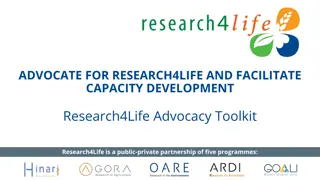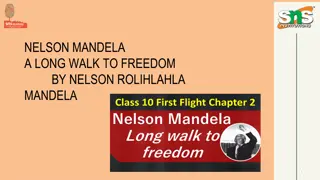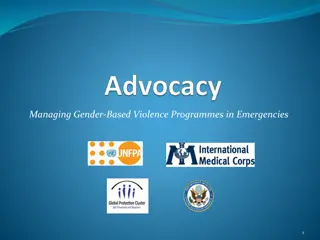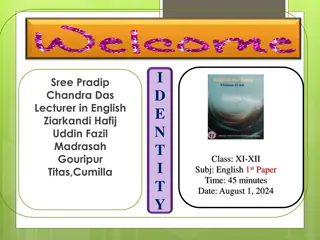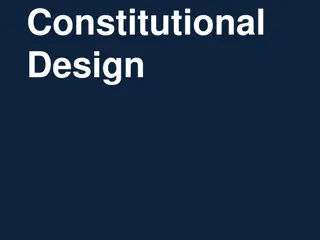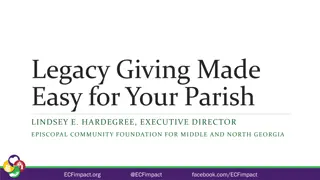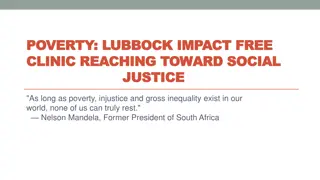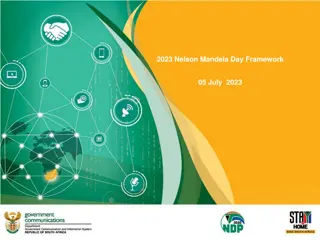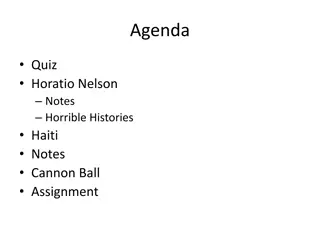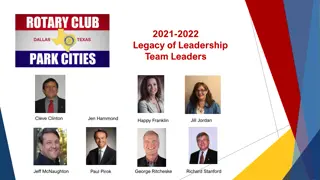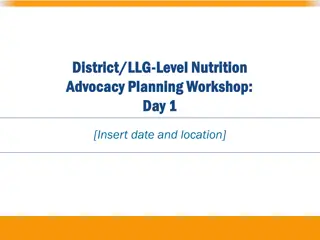Exploring the Life and Legacy of Nelson Mandela: A Lesson in Leadership and Advocacy
Delve into the inspiring journey of Nelson Mandela, from leading the fight against apartheid to becoming South Africa's first black president. Discover his unwavering dedication to justice, reconciliation, and human rights, showcasing the profound impact of his leadership on a global scale. Through group activities and engaging discussions, students learn valuable lessons in courage, compassion, and the power of positive change.
Uploaded on Oct 08, 2024 | 0 Views
Download Presentation

Please find below an Image/Link to download the presentation.
The content on the website is provided AS IS for your information and personal use only. It may not be sold, licensed, or shared on other websites without obtaining consent from the author. Download presentation by click this link. If you encounter any issues during the download, it is possible that the publisher has removed the file from their server.
E N D
Presentation Transcript
01st June, 2023 To our todays English Class
Md. Rafi Uddin Shamim Lecturer in English Mohammadpur Anowar Ali Islamia Alim Madrasah Mohammadpur, Chatkhil, Noakhali. Cell: 01837526799 Email: idbshamim@gmail.com Thanks to MD. Farid Uddin
ENGLISH FOR TODAY Class: Alim 1st year Subject: English 1st Paper Title: Unit-1 Lesson-1 Time : 45 minutes
Look at the picture and guess who the man is
Warm up activity: 1.Work in pairs. Who is the people in the picture? Why is he famous for? Make a list of some famous people that you have heard about and write about their contribution in their fields.
Unit One People or Institutions Making History Lesson 1 Nelson Mandela, from Apartheid Fighter to President
Group Work-1 15 December 2013 JOHANNESBURG (Reuters)- Nelson Mandela guided South Africa from the shackles of apartheid democracy, as an icon reconciliation who came to embody the struggle for justice around the world. Imprisoned for nearly three decades for his fight against white minority rule, Mandela never lost his resolve to fight for his people s emancipation. He was determined to bring down apartheid while avoiding a civil war. His prestige and charisma helped him win the support of the world to a multi-racial peace of and
Group Work-2 I hate race discrimination most intensely and in all its manifestations. I have fought it all during my life; I will fight it now, and will do so until the end of my days, Mandela said in his acceptance speech on becoming South Africa s first black president in 1994, The time for the healing of the wounds has come. The moment to bridge the chasms that divide us has come. We have, at last, achieved emancipation. In 1993, Mandela was awarded the Nobel Peace Prize, an honor he shared with F.W. de Klerk, the white African leader who had freed him from prison three years earlier and negotiated the end of apartheid our political
Group Work-3 Mandela went on to play a prominent role on the world stage as an advocate of human dignity in the face of challenges ranging from political repression to AIDS. He formally left public life in June 2004 before his 86th birthday, telling his adoring countrymen: Don't call me. I ll call you. But he remained one of the world s most revered public figures, combining celebrity sparkle with an unwavering message of freedom, respect and human rights. He is at the epicenter of our time, ours in South Africa, and yours, wherever you are, Nadine Gordimer, the South African writer and Nobel Laureate for Literature, once remarked.
Pair Work-1 The years Mandela spent behind bars made him the world s most celebrated political prisoner and a leader of mythic stature for millions of black South Africans and other oppressed people far beyond his country s borders. Charged with capital offences in the 1963 Rivonia Trial, his statement from the dock was his political testimony. During my lifetime.
Pair Work-2 I have dedicated myself to this struggle of the African people have fought against white domination, and I have fought against black domination. I have cherished the ideal of a democratic and free society in which all persons live together in harmony and with equal opportunities, he told the court. It is an ideal I hope to live for and to achieve. But if needs be, it is an ideal for which I am prepared to die. Friends adored Mandela and fondly called him Madiba, the clan name by which he was known. People lauded his humanity, kindness and dignity.
Individual work-1 Each of the following questions has a word with four alternative meanings. Choose the word which is closest in meaning in the context that has been used in the text. i. What does apartheid refer to in the title? a. apart b. distance c. discrimination d. dialogue
Individual work-1 ii. The word icon in the text means (line 3) a.portrait c. Symbol d. idol b. image iii. What does shackles refer to (line 3)? a. restraints c. stigma iv. race discrimination (line 9) refers to a.differences on the basis of caste, creed and colour b. competition among the members of a race c. demoralization of people d. domination of others b. sick d. spur
Individual work-1 v. The word manifestation (line 9) means a. presentation c. change vi. The word healing (line 12) means a. curing c. soothing b. right d. sign b. heating d. ailing
Home Work-1 4. Answer the following questions: a. The text is a report prepared by a news agency. A newspaper here is interested to publish it in a shortened form. Write a summary of the report for the newspaper. b. What do the following dates refer to? 1963 1993 1994 2004 c. Why did Nadine Gordimer remark that He (Mandela) is at the epicenter of our time, ours in South Africa, and yours, wherever you are? d. What emancipation did Mandela hint at by saying We have, at last, achieved our political emancipation ?
Home Work-2 5. Read the text below and fill in the gaps with the right use of verbs: Mandela ..(be) among the first to advocate armed resistance to apartheid, going underground in 1961 to form the ANC s armed wing. He . (leave) South Africa and . (travel) the continent and Europe, studying guerrilla warfare and building support for the ANC. Branded a terrorist by .(sentence) to life imprisonment in 1964, isolated from millions of his countrymen as they (suffer) oppression, violence and forced resettlement under the apartheid regime of racial segregation. He ..(imprison) on Robben Island, a penal colony of Cape Town, where he (spend) the next 18 years before being moved to mainland prisons. his enemies, Mandela
Home Work-3 6. Read the jumbled text and rearrange it into a cohesive paragraph. In his later years in prison, he met President P.W. Botha and his successor de Klerk. He was behind bars when an uprising broke out in the huge township of Soweto in 1976 and when others erupted in violence in the 1980s. As I finally walked through those gates ... I felt even at the age of 71 that my life was beginning anew. My 10,000 days of imprisonment were at last over, Mandela wrote of that day. When he was released on 11 February 1990, walking away from the Victor Verster prison hand-in-hand with his wife Winnie, the event was watched live by millions of television viewers across the world. But when the regime realized it was time to negotiate, it was Mandela to whom it turned.
Home Work-4 8. Now fill in the gaps in the text below using suitable words. Mandela s last major appearance on the ... . stage was in 2010 when he .... a cap in the South African .... . and rode on a golf cart, ... to an exuberant crowd of 90,000 .. the soccer World Cup final, one . the biggest events in the country s .... . apartheid history. I leave it to ...... . public to decide how they should . me, he said on South African ..... . before his retirement. But I should ... to be remembered as an ordinary . African who together with others has . his humble contribution.








